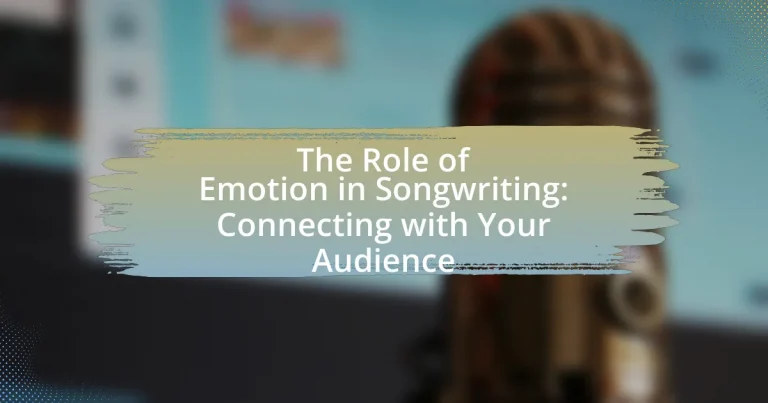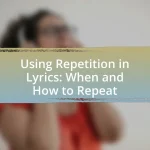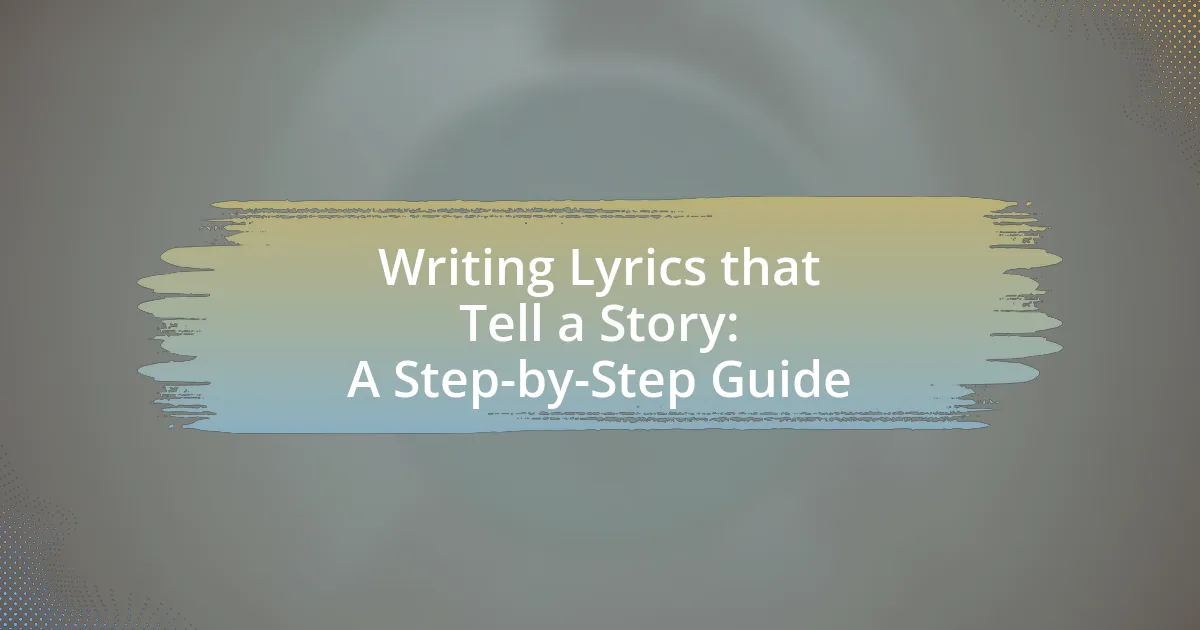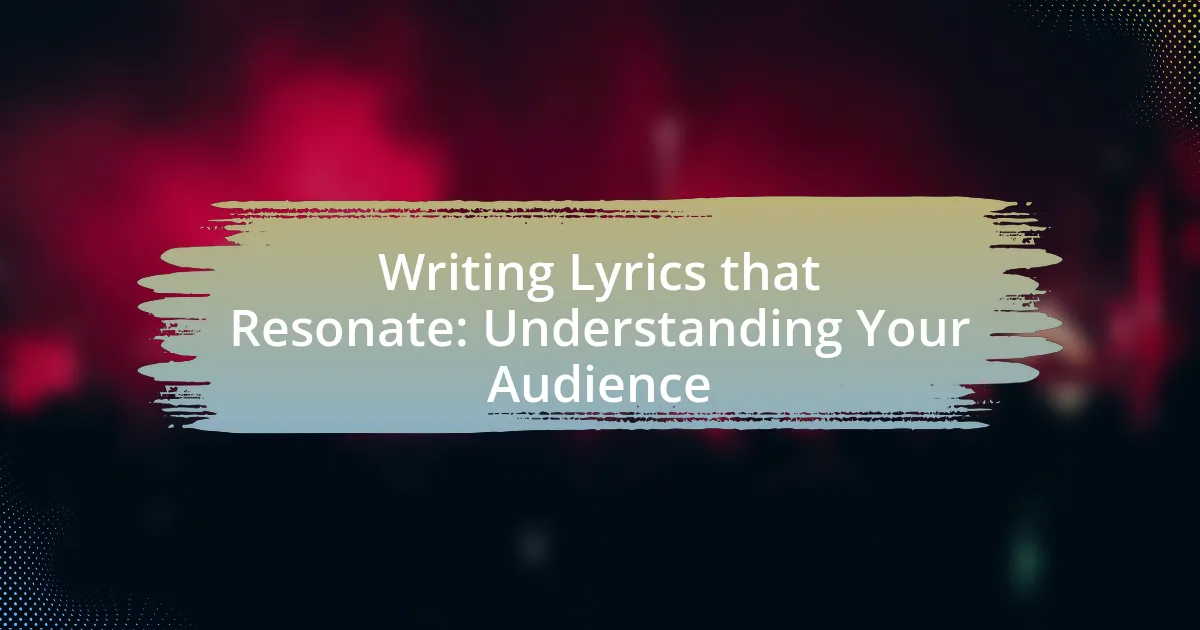The article examines the critical role of emotion in songwriting and its impact on connecting artists with their audience. It highlights how songwriters draw from personal experiences to convey authentic emotions through lyrics and melodies, enhancing listener engagement and memorability. Key topics include the influence of specific emotions such as love, sadness, and joy on the songwriting process, techniques for expressing emotions effectively, and the importance of emotional authenticity in achieving a lasting connection with listeners. Additionally, the article addresses challenges songwriters face in incorporating emotion and offers strategies to overcome these barriers, ultimately emphasizing the significance of emotional resonance in music.

What is the role of emotion in songwriting?
Emotion plays a crucial role in songwriting as it drives the creative process and enhances the connection between the artist and the audience. Songwriters often draw from personal experiences and feelings, which allows them to convey authentic emotions through their lyrics and melodies. Research indicates that songs that evoke strong emotions can lead to increased listener engagement and memorability. For instance, a study published in the journal “Psychology of Music” found that emotionally charged music can significantly impact listeners’ emotional responses, making them more likely to relate to the song. This emotional resonance is essential for creating a lasting impact and fostering a deeper connection with the audience.
How do emotions influence the songwriting process?
Emotions significantly influence the songwriting process by shaping the themes, lyrics, and melodies that resonate with listeners. Songwriters often draw from personal experiences and emotional states, allowing feelings such as joy, sadness, or anger to guide their creative choices. Research indicates that emotional expression in music can enhance listener engagement and connection; for instance, a study published in the journal “Psychology of Music” by Gabrielsson and Lindström (2001) found that songs conveying strong emotions are more likely to evoke similar feelings in the audience. This emotional authenticity not only enriches the songwriting process but also fosters a deeper bond between the artist and the audience.
What specific emotions are commonly expressed in songs?
Commonly expressed emotions in songs include love, sadness, joy, anger, and nostalgia. Love is often depicted through romantic themes, while sadness frequently emerges in ballads that explore loss or heartbreak. Joy is conveyed in upbeat, celebratory tracks, and anger is expressed through intense lyrics and powerful instrumentation. Nostalgia is often captured in reflective songs that evoke memories of the past. These emotions resonate with listeners, creating a strong connection between the artist and the audience, as evidenced by the widespread popularity of songs that evoke these feelings across various genres.
How do songwriters tap into their own emotions?
Songwriters tap into their own emotions by reflecting on personal experiences and feelings, which serve as the foundation for their lyrics and melodies. This introspection allows them to express vulnerability and authenticity, making their music relatable to listeners. Research indicates that emotional expression in songwriting can enhance the connection with the audience, as evidenced by studies showing that songs conveying genuine emotions resonate more deeply with listeners, leading to increased engagement and emotional response.
Why is emotional connection important in songwriting?
Emotional connection is crucial in songwriting because it enables artists to resonate deeply with their audience, fostering a sense of shared experience. When songwriters convey genuine emotions, listeners are more likely to relate to the themes and messages, leading to a stronger bond. Research indicates that songs that evoke emotions can enhance memory retention and listener engagement, as demonstrated in a study published in the Journal of Consumer Research, which found that emotionally charged music significantly influences consumer behavior and preferences. This connection not only enhances the impact of the song but also encourages listeners to form personal attachments to the music, ultimately driving its success and longevity.
How does emotional connection enhance listener engagement?
Emotional connection enhances listener engagement by fostering a sense of relatability and resonance with the content. When listeners feel emotionally connected, they are more likely to pay attention, remember, and respond to the material. Research indicates that emotional responses can increase memory retention by up to 70%, as emotions activate the amygdala, which plays a crucial role in processing emotional experiences and forming memories. This heightened engagement leads to deeper connections with the material, making it more impactful and memorable for the audience.
What impact does emotional authenticity have on a song’s success?
Emotional authenticity significantly enhances a song’s success by fostering a deeper connection with listeners. When artists convey genuine emotions, it resonates with audiences, leading to increased engagement and relatability. Research indicates that songs perceived as emotionally authentic are more likely to be streamed, shared, and remembered. For instance, a study published in the Journal of Consumer Research found that emotional authenticity in music can elevate listeners’ emotional responses, which in turn boosts their likelihood of recommending the song to others. This connection not only drives immediate popularity but also contributes to long-term success in an artist’s career.

How do songwriters effectively convey emotion?
Songwriters effectively convey emotion by utilizing lyrical content, melody, and instrumentation to create a relatable and immersive experience for listeners. Lyrically, songwriters often draw from personal experiences or universal themes, allowing audiences to connect emotionally with the narrative. For instance, the use of vivid imagery and specific details can evoke strong feelings, as seen in songs like “Tears in Heaven” by Eric Clapton, which addresses loss and longing. Melodically, the choice of key, tempo, and chord progressions can enhance the emotional impact; minor keys often evoke sadness, while major keys can convey happiness. Instrumentation also plays a crucial role; for example, the use of strings can add a layer of poignancy to a song. Research indicates that emotional responses to music are linked to brain activity, with studies showing that music can trigger the release of dopamine, reinforcing the emotional connection between the songwriter and the audience.
What techniques do songwriters use to express emotions?
Songwriters use various techniques to express emotions, including lyrical imagery, melody, and chord progression. Lyrical imagery allows songwriters to create vivid pictures that evoke specific feelings, such as nostalgia or longing, making the listener connect emotionally with the song. Melody plays a crucial role as well; for instance, a minor key can convey sadness, while a major key often expresses happiness. Additionally, chord progressions can enhance emotional impact; for example, the use of a descending bass line can evoke a sense of melancholy. These techniques are supported by studies showing that music can elicit strong emotional responses, with research indicating that certain musical elements consistently trigger specific feelings in listeners.
How do lyrics contribute to emotional expression in songs?
Lyrics contribute to emotional expression in songs by conveying specific feelings and narratives that resonate with listeners. The choice of words, imagery, and themes in lyrics can evoke a wide range of emotions, such as joy, sadness, anger, or nostalgia. For example, a study published in the Journal of Music and Emotion found that lyrics that reflect personal experiences or relatable situations enhance emotional engagement, allowing listeners to connect deeply with the song. This connection is further strengthened when the lyrical content aligns with the musical elements, such as melody and rhythm, creating a cohesive emotional experience.
What role does melody play in conveying emotion?
Melody plays a crucial role in conveying emotion by shaping the listener’s emotional response through its structure and movement. Specific melodic intervals, such as major and minor scales, evoke distinct feelings; for instance, major melodies often elicit happiness, while minor melodies can evoke sadness. Research by Juslin and Västfjäll (2008) in “Emotional responses to music: The need for a multidimensional model” highlights that melodies can trigger emotional reactions due to their ability to mimic human vocal expressions, which are inherently tied to emotional communication. Thus, the design of a melody directly influences the emotional experience of the audience, making it a vital component in songwriting.
How can instrumentation enhance emotional impact?
Instrumentation enhances emotional impact by utilizing specific musical elements to evoke feelings and create a connection with the audience. For instance, the choice of instruments can influence the mood; strings often convey sadness or nostalgia, while brass can evoke triumph or excitement. Research indicates that different timbres and dynamics can trigger emotional responses in listeners, as demonstrated in a study by Juslin and Västfjäll (2008), which found that variations in instrumentation significantly affect emotional perception in music. Thus, effective instrumentation not only supports the lyrical content but also amplifies the emotional experience, making the music more relatable and impactful for the audience.
What instruments are best suited for evoking specific emotions?
String instruments, particularly the violin and cello, are best suited for evoking specific emotions due to their expressive range and ability to convey nuances in tone. The violin can create a sense of joy or sadness through its ability to produce high, soaring notes or deep, melancholic sounds, while the cello often evokes feelings of warmth and introspection with its rich, resonant tones. Research indicates that string instruments are particularly effective in film scores for eliciting emotional responses, as demonstrated in studies analyzing audience reactions to cinematic music.
How does arrangement affect the emotional tone of a song?
Arrangement significantly affects the emotional tone of a song by determining how musical elements are structured and presented. The choice of instrumentation, dynamics, tempo, and the order of sections can evoke specific feelings; for instance, a slow tempo with soft instrumentation often conveys sadness, while a fast tempo with strong percussion can create excitement. Research indicates that arrangement influences listener perception, as demonstrated in a study by Juslin and Västfjäll (2008), which found that variations in musical arrangement can lead to different emotional responses in listeners. Thus, the arrangement serves as a crucial tool for songwriters to connect emotionally with their audience.
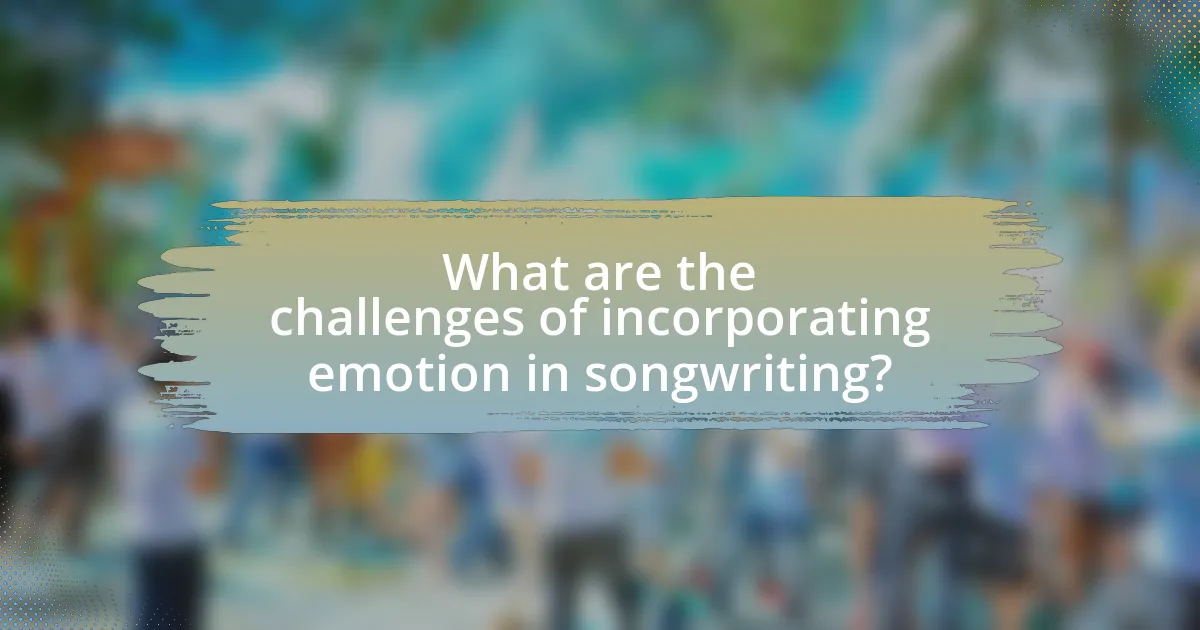
What are the challenges of incorporating emotion in songwriting?
Incorporating emotion in songwriting presents several challenges, primarily the difficulty of authentically expressing complex feelings while maintaining relatability. Songwriters often struggle to balance personal experiences with universal themes, as overly specific emotions may alienate listeners, while generic expressions can lack depth. Additionally, the technical aspects of songwriting, such as melody and structure, can conflict with emotional expression, making it hard to convey feelings effectively. Research indicates that emotional authenticity is crucial for audience connection, as demonstrated in studies showing that songs with genuine emotional content resonate more with listeners, enhancing their engagement and connection to the music.
What common pitfalls do songwriters face when expressing emotions?
Songwriters commonly face pitfalls such as cliché usage, lack of authenticity, and overgeneralization when expressing emotions. Clichés dilute emotional impact, making lyrics feel unoriginal and uninspired. Lack of authenticity can lead to disconnection with the audience, as listeners often seek genuine experiences and feelings in music. Overgeneralization results in vague lyrics that fail to resonate deeply, as specific emotions and personal experiences tend to create stronger connections. These pitfalls hinder the songwriter’s ability to effectively convey emotions and engage their audience.
How can clichés undermine emotional authenticity?
Clichés can undermine emotional authenticity by diluting the unique expression of feelings in songwriting. When songwriters rely on overused phrases or ideas, they risk creating a disconnect between the artist’s genuine emotions and the audience’s experience. Research indicates that originality in lyrics enhances listener engagement, as evidenced by a study published in the Journal of Popular Music Studies, which found that songs with unique lyrical content are more likely to resonate with audiences. This suggests that clichés, by their very nature, can lead to a lack of emotional depth and relatability, ultimately hindering the connection between the songwriter and the audience.
What strategies can songwriters use to avoid emotional disconnect?
Songwriters can avoid emotional disconnect by employing strategies such as personal storytelling, using vivid imagery, and engaging in active emotional reflection. Personal storytelling allows songwriters to draw from their own experiences, creating authentic connections with listeners. For instance, songs like “Fast Car” by Tracy Chapman resonate due to their relatable narrative. Utilizing vivid imagery helps to paint emotional landscapes that listeners can visualize, enhancing their emotional engagement. Additionally, engaging in active emotional reflection, where songwriters analyze their feelings and experiences, can lead to more genuine lyrics that resonate deeply with audiences. Research indicates that songs with personal and relatable themes tend to perform better in terms of listener engagement and emotional response, reinforcing the effectiveness of these strategies.
How can songwriters overcome emotional barriers?
Songwriters can overcome emotional barriers by engaging in self-reflection and utilizing creative techniques such as journaling or free writing. Self-reflection allows songwriters to identify and process their emotions, which can lead to more authentic songwriting. Techniques like journaling help in articulating feelings, while free writing encourages spontaneous expression without self-censorship. Research indicates that expressive writing can reduce emotional distress and enhance creativity, as shown in studies by Pennebaker and Chung (2007), which highlight the therapeutic benefits of writing about emotions. By actively addressing their emotional states, songwriters can create more relatable and impactful music.
What practices can help songwriters access deeper emotions?
Songwriters can access deeper emotions through practices such as journaling, meditation, and exploring personal experiences. Journaling allows songwriters to articulate their feelings and thoughts, which can lead to more authentic lyrics. Meditation helps in clearing the mind and fostering emotional awareness, enabling songwriters to tap into their subconscious feelings. Additionally, reflecting on personal experiences, including both joyful and painful moments, provides rich material for songwriting, as emotional authenticity resonates with audiences. Research indicates that emotional expression in music can enhance listener engagement, supporting the idea that deeper emotional access leads to more impactful songwriting.
How can feedback from others aid in emotional expression?
Feedback from others can significantly aid in emotional expression by providing external perspectives that validate or challenge an individual’s feelings. This external validation can enhance self-awareness, allowing individuals to articulate their emotions more clearly. For instance, when songwriters receive feedback on their lyrics, they can identify which emotions resonate with listeners, thus refining their emotional expression. Research indicates that social feedback can enhance emotional intelligence, enabling individuals to better understand and convey their feelings. A study published in the Journal of Personality and Social Psychology found that individuals who engage in feedback exchanges are more adept at recognizing and expressing their emotions, which is crucial in songwriting and connecting with an audience.
What are some best practices for connecting with your audience through emotion?
To connect with your audience through emotion, utilize storytelling, authenticity, and relatable experiences. Storytelling engages listeners by creating a narrative that resonates with their own lives, making them feel understood. Authenticity fosters trust; when artists express genuine emotions, audiences are more likely to connect deeply. Relatable experiences, such as shared struggles or joys, evoke empathy and strengthen the emotional bond. Research indicates that emotional storytelling can increase audience engagement by up to 65%, highlighting its effectiveness in creating connections.
